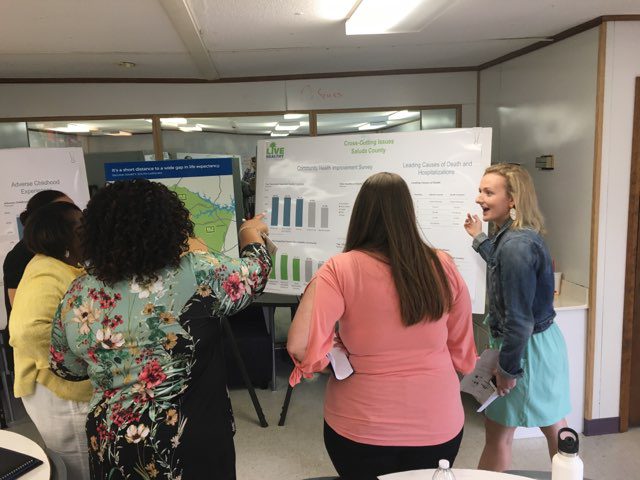South Carolina Community Data Walks

Submission Date: July 2022
State/Territory Submitted on the Behalf of: South Carolina
Funding Source: State/local sources
CDC Funding:No
CDC Funding (Specified): Grant Number:n/a
Other Federal Funding:N/A
Other Funding:State funding, Local funding
Domain Addressed:Epidemiology and Surveillance
Public Health Issue:The South Carolina Department of Health and Environmental Control (SC DHEC) released a State Health Assessment (SHA) in 2018 that ignited some concerns voiced by SC communities regarding the fact that problems facing the state were not the same across all communities. As a result of the SHA and to address public concerns, SC DHEC hosted data walks to initiate community health improvement processes to help realign public health efforts
Project Objectives:Collaboration with community coalitions to present, discuss and analyze data via health equity lenses. Conduct data walks to disseminate data, enable community members to make data driven decisions and spark change ultimately to positively impact communities.
Program Action:Data walks were held in various SC counties using local level data for partners and stakeholders using the Urban Institute Data Walks Model to realign public health efforts based on the Mobilization for Action through Planning and Partnerships Model. Invitations to the data walks were sent to various sectors of the community including education, healthcare, government and faith-based organizations. During each data walk, participants were split into small groups and rotated through 8 different data sections: chronic disease, behavioral health, infectious disease, maternal and child health, access to care, injury, demographics & cross-cutting.
Data/Other Information Collected:During the data walks, participants spent 6-8 minutes at each station where they interacted with data experts that described trends, discussed at-risk groups, and answered any questions. After participants completed each section, a facilitated discussion took place where highlights, reactions, and opinions about the data were shared to gain real time perspectives on County trends. The open discussions allowed health equity and racial injustice conversations to be had while addressing how communities can work together to positively shift data trends towards better health and racial justice outcomes.
Impact/Accomplishments:A total of 20 data walks were held, and over 1200 community members were engaged. Each event presented over 50 community health indicators across 8 data sections. After attendees discussed the health issues prevalent in their communities, a vote was held to select the top 3 priority health areas for community focus. Community members signed up for work groups based on the top 3 priority areas where they felt they could be useful.
Challenges/Lessons Learned:A key criterion in having a successful data walk is ensuring county-wide representation amongst various sectors in the community. Early iterations of data walks were very government-sector heavy, with a strong SC DHEC presence. To ensure large representation amongst various sectors and locations in the community, SC DHEC Central Office staff worked with Community Systems Teams to train them on who should be invited. An icebreaker was also developed to highlight which sector and where in the county participants were representing. This icebreaker has provided a great visual in showing the diversity the data walk represents. With greater diversity the data walks have become a true community event.
Next Steps:Data walks have gained popularity across the state and plans are in place to host community data walks in every county in the state every three to five years, to align with the community health improvement planning process. Data walks can also be tailored to specific populations (i.e., older populations, tribal populations) to ensure vulnerable populations have access to important data points that can empower data-driven decisions.
https://scdhec.gov
Epidemiology and Surveillance, Healthy Communities (general)
State Contact Information:
Columbia South Carolina
Emmanuelle Durant
SC DHEC
803-898-3425
duranter@dhec.sc.gov
No
<< Back to All Success Stories